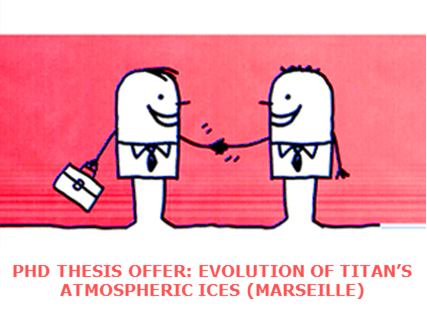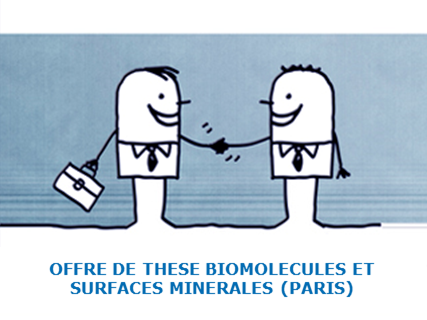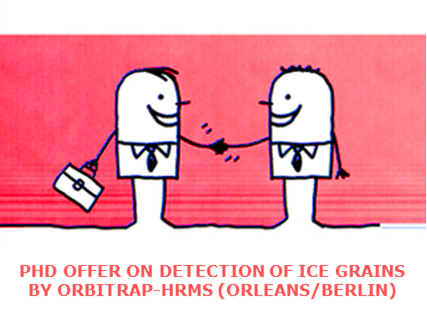Molecular limits of Life in extraterrestrial conditions
IBS Laboratory
Advisor: Bruno Franzet
SUBJECT DESCRITION:
The ELMA group from the “Structural Biology Institute” (IBS) in Grenoble, in collaboration with the “Institut de Planétologie et d’Astrophysique de Grenoble” (IPAG) and the “Institut des Sciences de la Terre” (ISTerre), are offering a PhD position in exobiology. The project is funded by the IDEX program of the Grenoble-Alpes university (project “Origin of Life”). Starting on Oct, 2018, the position offers the possibility to explore the molecular limits of Life in extraterrestrial conditions using a cross disciplinary approach.
Context: Microbial life has been found in extreme environments similar to planetary conditions recently suggested by the boom in the investigations of habitability of planets and moons. Understanding how life has adapted to extreme conditions on Earth and searching for life on another planet are therefore intrinsically interrelated issues. The “Origin of life” project, funded by the IDEX program of the Grenoble-Alpes university brings together astronomers, planetologists, chemists and biologists to work together on this question. In this context, the aim of the ELMA group is to specify the environmental physico-chemical limits in which pivotal biochemical/cellular functions can be maintain. The effect of extreme temperatures, solvent and pressure conditions on chosen model biological systems are explored thanks to a dedicated platform located at IBS and collaboration with the Institut Laue Langevin neutron source.
PhD Subject: Extremophiles are often exposed to multiple stressors and it is assumed that cellular life is primarily limited by the stability/functioning of large molecular assemblies. Our preliminary data indicated that high pressure and specific solvent conditions may greatly displace the temperature windows allowing molecular dynamics properties compatible with biocatalysis. Such conditions could be found in the deep sub glacial oceans of Europa and Encelade. Moreover, Martian brines could also represent conditions in which biocatalysis could be detected. Environmental conditions corresponding to Solar System objects exists on earth. For instance, the Deep Halophilic Anoxic Lakes (DHAL’s) located in the depths of the Mediterranean Sea combine hypersalinity, anoxia, darkness and high pressure similar to the ones expected below the surface of Europa. In this project, the physico-chemical conditions to be tested as well as the experimental data will be routinely discussed with the scientists from IPAG and ISTerre that will co-supervise the PhD student. Cellular machines arising from relevant extreme earth biota such as deep sea brines, deep sea thermal vents, salted volcanic springs etc will be purified at IBS. Three types of molecular machineries have been selected (polymerases, chaperones and proteases). Representants of theses machineries arising from different types of extremophiles were already successfully purified at IBS and at IFREMER-Brest (collaboration with the group of D. Flament). Their robustness will be assessed by using high pressure X-ray crystallography (ESRF), small angle X-ray scattering (Synchrotron Soleil). Their biochemical activities will be measured at IBS and their molecular dynamic properties will be determined by neutron spectrometry at ILL (Institut Laue Langevin).
Candidate profile: The ELMA group is seeking to hire a PhD student to participate to the COOL project. He/She should have a training in biochemistry and/or biophysics with a strong interest in Biology of extremophiles, biophysics and biochemistry.
ELIGIBILITY CRITERIA:
Applicants:
– must hold a Master’s degree (or be about to earn one) or have a university degree equivalent to a European Master’s (5-year duration),
Applicants will have to send an application letter in English and attach:
– Their last diploma
– Their detailed CV
– Their grades obtained during Master 1 and Master 2
– A letter of motivation (2 to 3 pages max)
– Letters of recommendation are welcome.
Address to send their application: bruno.franzetti@ibs.fr
SELECTION PROCESS:
Application deadline: 01 June 2018 at 17:00 (CET)
Applications will be evaluated through a three-step process:
1. 1st round of selection: the applications will be evaluated by a Review Board in the week of 11 June 2018. Results will be given the 15 June 2018.
2. If necessary a 2nd round of selection will be organized: shortlisted candidates will be invited for an interview session in Grenoble or by skype during the week of 18 June 2018. (if necessary)
3. Eligibility check by doctoral school early July
4. Beginning of the PhD : October or November 2018
CONTRACT:
TYPE: temporary-3 years of doctoral contract
JOB STATUS: Full time
HOURS PER WEEK: 35
OFFER STARTING DATE:
Salary: between 1768.55 € and 2100 € brut per month (depending on complementary activity or not)






Aucun commentaire sur l'article Proposition de thèse à Grenoble sur les extrémophiles